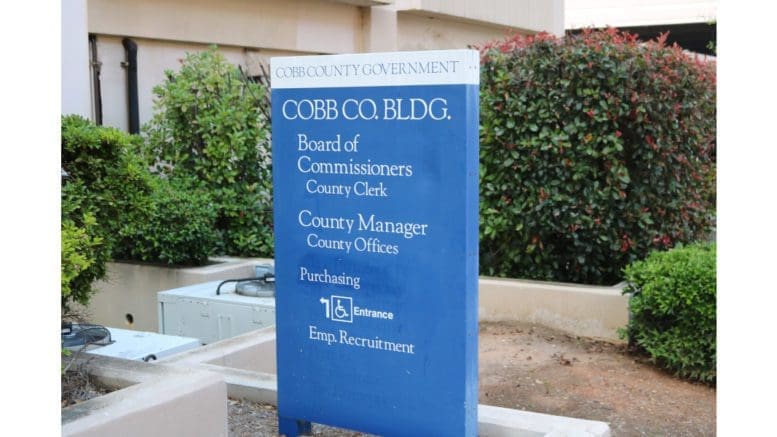By Caleb Groves
At the Cobb County Board of Commissioners’ monthly zoning hearings, the board approved signing a settlement litigation for a rezoning application denied in 2023, applied for by former Gov. Roy Barnes.
In 2022, Barnes filed an application to convert his nearly 1901 acres of farmland into a residential subdivision. After the board denied the request the subsequent year, he filed a lawsuit against the county, for allegedly depriving the applicant and owner of the property’s constitutional rights.
To reach a middle ground, the applicant revised the site plan and asked the board to sign a settlement of litigation rather than further litigating the case. The updated plans reduced the number of homes from 132 to 114, consolidated the homes into 65 acres added 125 acres of open space and changed the requested zoning category.
The proposed settlement also increases the lot size; the applicant requested 20,000-foot residential lots rather than the initial proposal of 15,000-foot lots.
Additionally, attorney Kevin Moore, representing the applicant, said the added open space would help counter the largest area of concern, stormwater.
Flooding concerns
The Powder Springs property is located on the east and west side of Brown Road and north of Stout Parkway, which has faced flooding challenges in the past. Moore spoke about the concerns regarding the 100-year floodplain.
“What we’ve discussed with the community we’ve had discussions with, much of it has been about stormwater management concerns,” Moore said. “And that is the number one issue that they have consistently stated.”
He went on to discuss the 100-year floodplain, which is integrated into the 125 acres of open space designed to reduce flooding concerns.
“A 100-year floodplain by its very nature and definition is there for a reason; it’s there along Sweetwater Creek as a 100-year floodplain because when it rains, it’s there to hold that water,” Moore said. “That’s what a 100-year floodplain does.”
As a precaution to mitigate potential flood damage, all houses are outside the floodplain and all homes adjacent to the floodplain will be raised 6 feet above the floodplain elevation, he said.
“From a stormwater concern, though, the best thing you can do is leave the floodplain alone,” he said. “The best thing you can do is ensure that floodplain is not included in anybody’s private home ownership as part of a lot.”
Community pushback
Although the newly proposed subdivision is smaller, Clithon Rice, President of the Brown’s Crossing Homeowners Association, cautioned development in this area due to the potential for flooding and the housing density of each home.
Rice was concerned with the requested open space, which consolidates the homes into a minority of each property and is inconsistent with the zoning of neighboring properties.
He presented to the board a series of images from the 2009 flood and the proximity of a neighboring property to the floodplain in January 2024, which he labeled “extensive.”
One image from the 2009 flood depicted a submerged car on Brown Road, while two people boated around above the road.
“It’s going to rain, that’s a small amount of rain that happened in January,” Rice said. “What is going to happen when we get heavy rain? And we know it’s going to come because we have global warming.”
Yet, Rice was sympathetic to the profit considerations of Barnes’s proposition, “If I was in their position, I’d probably do the same thing because it’s good business.”
He went on to discuss a recent conversation with Barnes about what he wanted from the property.
“I really would like the county to buy the land, extend Stout Park, make something great for the county,” he said. “That would make everybody happy, I think.”
Instead of developing the land for a densely packed subdivision, Rice proposed that the county purchase the land for a nearby park as a Stout Park extension.
“Most of us, we’re not going anywhere; we love it here,” he said. “All we’re asking is, we’re not against development; keep it R-20 (20,000 square feet per lot).”
Later in the meeting, Chairwoman Lisa Cupid pushed back against keeping the subdivision zoned as R-20 and saw the added open space as an improvement.
“So there was a lot of correspondence and communication today, ‘well, just keep it R-20. It’s status quo. It’s going to flood anyway,’” Cupid said. “But I thought this whole discussion was to prevent flooding and that’s what we’re trying to address here. And if we were to allow things to be status quo or as they are today, we’re going to get more of the same of what we do have.”
The board approved the settlement litigation in a 3-2 vote, with Commissioner Keli Gambrill and Commissioner JoAnn Birrell in opposition.
“The situation may not be ideal for some that don’t think anything should be done and think that the county should purchase the property,” Cupid said. “I see it as a step forward.
St. Benedict’s Episcopal School campus expansion
Hours earlier, at an over-six-hour meeting, the board approved the 0.65-acre campus expansion of St. Benedict’s Episcopal School.
Following last month’s meeting and comments from staff, the board reviewed the updated application for the school’s campus expansion, which adds a gymnasium, outdoor classroom and cafeteria.
This addition follows the school’s middle school campus expansion, which the board approved in 2022.
With no opposition, Commissioner Jerica Richardson pulled the three agenda items associated with St. Benedict’s from the regular cases and put them on the consent agenda for approval.
In a 5-0 vote, the board approved the expansion.

Caleb Groves is a Journalism student at Kennesaw State University, where he is a junior.
Originally from Minnesota, Caleb moved to Georgia with his family, where he now lives in Woodstock with his Father, Stepmom and numerous pets.
When he is not in writing, in class or coaching rock climbing, he spends his time listening to music and rock climbing both indoors and out
